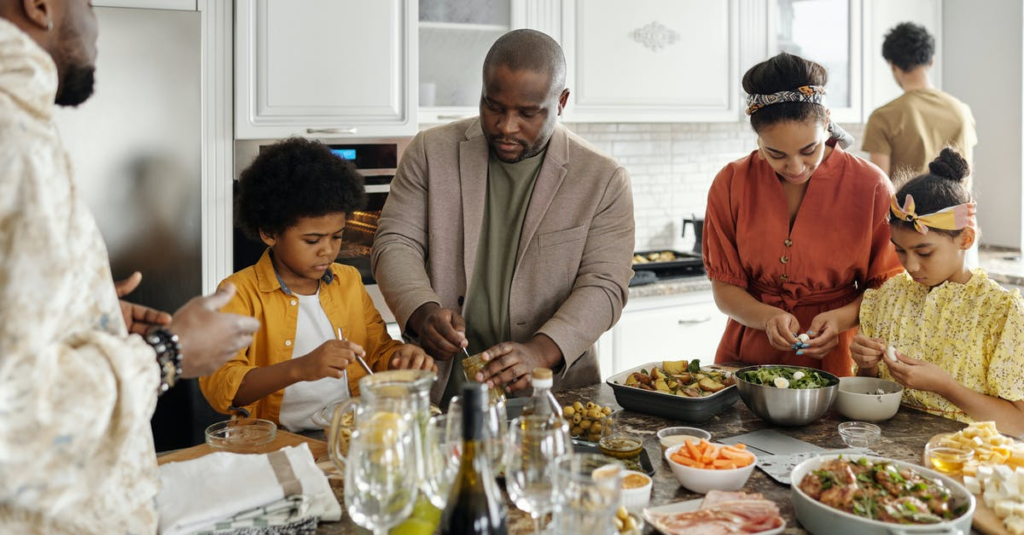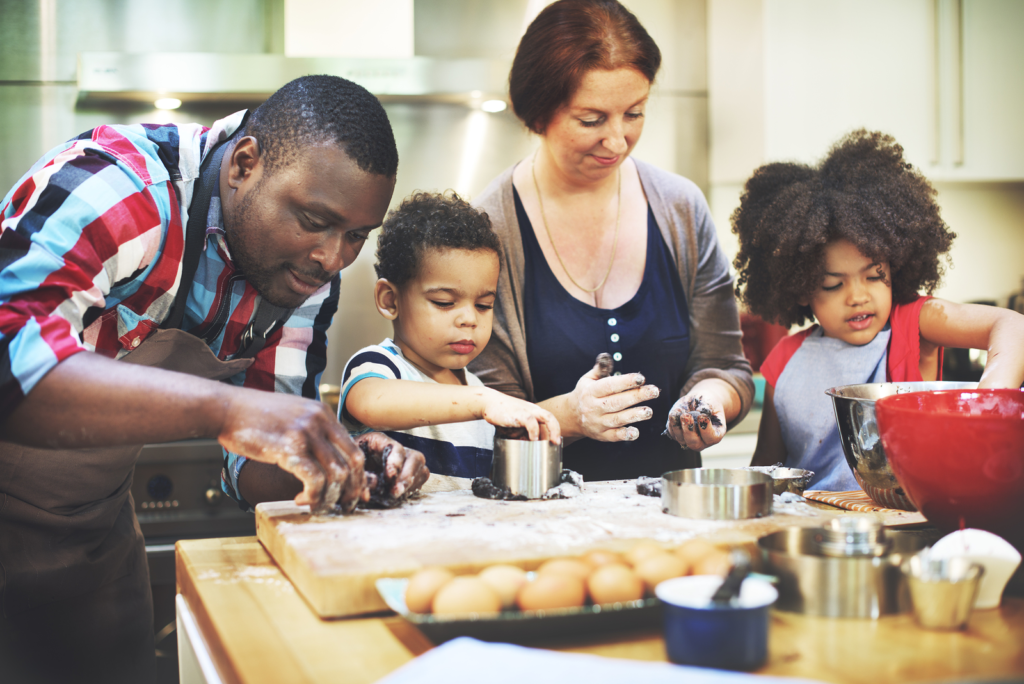
The health benefits of cooking with children go beyond just cooking to parental bonding, sharing healthy recipes, and the fun of eating together as a family. These days, it is difficult for busy parents even to take time out to teach their children basic cooking techniques.
While it is true that cooking with children requires time, patience, and some extra cleanup, especially when the children are younger. But many experts think it is well worth the effort. This is because cooking with children can help get them interested in trying healthy foods they might normally turn up their noses at.

Healthy Benefits Of Family Mealtime
Normally, children will always be children, as they continue to snack on chips at a school party or enjoy ice cream after sports. Yet, what is important is how they eat most of the time and how you as a parent can play a role. It is good to remember that your children’s healthy eating means eating more fruits and vegetables, whole grains, and beans when possible. As well as leaner types of animal foods, even some fish every now and then.
Short-term Health Benefits Of Cooking With Children

- Encourages kids to try healthy foods.
- Helps kids feel like they are achieving something and contributing to the family.
- More likely to sit down to a family meal when they helped prepare it.
- Parents get to spend quality bonding time with their kids.
- Spend less time in front of the TV or computer while they are cooking.
- Less likely to eat junk food when they are cooking a meal at home.
Long-term Health Benefits Of Cooking With Children

- Learning to cook is a skill your children can use for the rest of their lives.
- Kids who learn to eat well are more likely to eat healthfully than adults.
- Positive cooking experiences can help build self-confidence.
- Kids who cook with parents are less likely to abuse drugs.
3 Steps You Can Take To Prevent Unhealthy Habits

Experts say cooking with your children means better resistance against pressure from peer groups and bad habits. Therefore, find below three steps you can take to prevent unhealthy habits:
Be caring and supportive of your child

Parents get many opportunities to complement and support their children while they are in the kitchen together. How important is this? Parental praise, affection, acceptance, and family bonding, as felt by children, are linked to a reduced risk of bad peer habits. Surveys show that teens who have an excellent relationship with their parents have a lower risk of falling prey to peer group pressure.
Open the lines of communication

Kids having fun in the kitchen, elbow to elbow, are likely to interact with each other and with their parents. Cooking together gives parents and children time to talk and share thoughts and stories. Communication does not start when your child is 17. It should start when your child is 3.
Eat dinner together regularly

Involving your kids in the kitchen is a big stepping stone to getting them to appreciate family meals. Because of challenging work, school, and sports schedules, many families struggle to sit down for even one daily meal together. But you can start by maximizing weekend opportunities to eat together. Though for many, dinner offers the best opportunity for cooking with your children day in and day out.
How To Start Cooking With Children

One good place to start is the first meal of the day: breakfast. Evidence suggests eating breakfast improves memory and test grades. Some elements of a healthy breakfast are high-fiber and nutrient-rich whole grains, fruits, and dairy products.
If you are short on time in the morning, start cooking breakfast with your kids on the weekends, during the holidays, or on school holidays.
Tips To Encourage Children To Cook

Set out some washed and sliced fruits and vegetables to munch on, and nutritious or zero-calorie beverages to sip while you are cooking. This means the children (and you!) will be less likely to nibble on the dinner ingredients while you work.
And just how old do your children have to be to help out in the kitchen? Many start to express an interest in cooking at around 2 or 3, and that is not too early to start.
Especially for younger children, arrange the work area so they are less likely to spill. Remember that the easier dishes are to prepare, the more likely the kids will try making them again. So, begin with things like salad, cookies, pasta, smoothies, and fun sandwiches. And gradually work your way up to the fancier stuff.
Some Cooking Skills Your Children Should Know
Under 5 Years Old

- Scrub, dip, tear, break, and snap (for example, snapping the ends off green beans)
- Shake, spread, and cut with a cookie or biscuit cutter
- Peel (some items), roll, juice, and mash
- Remove husks from corn
- Wash vegetables in a colander
- Measure and pour some ingredients
- Hand Mix
8-10 Years Old

Everything listed above, plus some more advanced duties, such as:
- Cracking and separating eggs
- Inventing their own easy-to-fix recipes
- Using the electric mixer (with adult supervision)
- Stirring food over the stove (with adult supervision)
- Operating a can opener or food processor with safety features
- Grating cheese, vegetables
- Cutting vegetables, fruits, etc. (using a plastic knife or dinner knife
Bottom Line

Encouraging children to try healthier foods is not only the benefit of cooking as a family. Indeed, cooking with children has both short-term and long-term payoffs. These include family bonding, a healthy lifestyle, and resistance to bad peer pressure habits.

https://www.jumia.com.ng/mlp-unilever-store/
Photo Credit: Creative Commons


